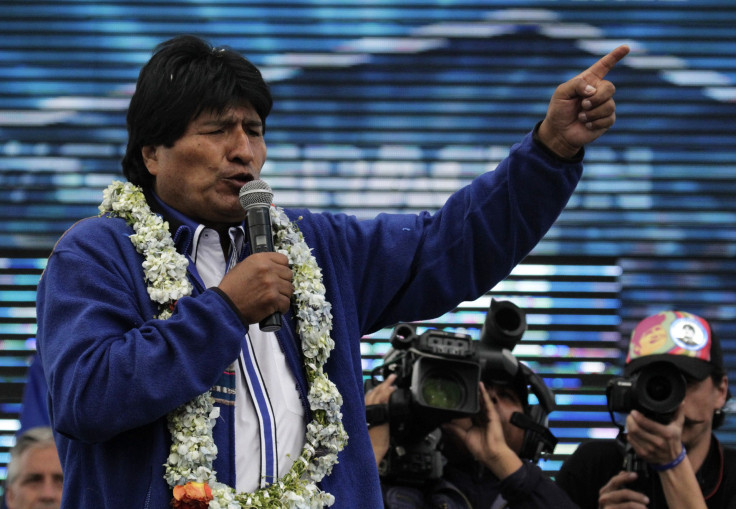Bolivia’s Evo Morales Poised For Third Presidential Term

While upcoming presidential elections in Brazil and Uruguay have Latin America watchers on the edge of their seats, there’s one election in the region that is bound to bring few surprises – that of Bolivian president Evo Morales. The socialist leader is poised to win a third term as president on Sunday, putting him on track to become the country’s longest-serving president when his time in office ends in 2020.
With a 41-point lead in the polls and a simple election slogan of “Vamos bien” – “We’re doing well” – Morales’ win on Sunday is all but guaranteed, to the point where the president hasn’t even felt the need to debate his opponents. But he didn’t generate quite as much goodwill when he first stepped into the presidency in 2005. Although he shook up Bolivia’s political scene as the country’s first indigenous head of state, the U.S. State Department warned against his background as leader of the nation’s largest coca-growers union, and foreign investors were wary of his plans to nationalize Bolivia’s gas reserves.
But as his government has expanded benefits for the poor, maintained political stability, secured the region’s highest rate of poverty reduction, and maintained strong economic growth – at close to 7 percent in 2013 – there are many reasons for Bolivians to remain satisfied with where the country is headed. During his tenure, Morales consolidated much of the economy, including natural resources, under state control, giving his government the ability to pump cash into social programs and public works projects and share the wealth among broader swaths of Bolivian society.
Nevertheless, some Bolivians have been unnerved by Morales’s expansion of state power. Opponent and former president Jorge Quiroga has called Morales’s government an “authoritarian, abusive regime,” and opposition politics heavily criticized last year’s court decision that allowed him to run for a third term, even though Bolivian law mandates a two-term limit for presidents. According to the court, the law did not apply to Morales’s first term in office since the constitution was changed during that period.
Internationally, Morales has probably been best known for some of his more incendiary remarks against capitalism and U.S. policies, akin to the fiery rhetoric of his close ally and late Venezuelan leader Hugo Chavez. Speaking at the UN General Assembly last month, Morales called Obama a “war criminal” and “imperialist.” Meanwhile, many may distinctly recall his outrage after having his plane rerouted in Europe in 2013 upon suspicions that former National Security Agency contractor Edward Snowden was aboard the flight.
Morales won his last presidential election in 2009 with 64 percent of the vote. As the country heads to the voting booths Sunday, Morales carries the support of around 59 percent of voters.
© Copyright IBTimes 2024. All rights reserved.






















